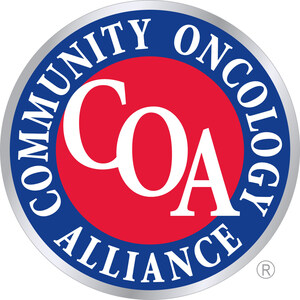Sequestration Cuts Threaten Seniors' Cancer Care And Will Increase Medicare Costs
Just-Released Survey of Oncology Providers Shows Sequestration Imperils Cancer Care Delivery System Already Under Pressure
WASHINGTON, March 14, 2013 /PRNewswire/ -- The Community Oncology Alliance (COA) announced today the results of a national survey of oncology providers about the impact of the sequestration cuts to Medicare payments for cancer drugs and services effective April 1, 2013. The survey revealed that the planned sequestration cuts to cancer drugs and services will force 72% of community oncology practices to stop seeing new Medicare patients, not treat any Medicare patients without secondary insurance, and/or send Medicare patients elsewhere for treatment.
Based on the survey, and a study conducted by Milliman on the cost differential between cancer care delivered in the practice versus hospital setting1, the sequestration cuts will actually end up costing Medicare at least an estimated $2 billion on an annualized basis due to the shift to more expensive treatment settings. The impact is so substantial because approximately 50% of all cancer patients are covered by Medicare. More importantly, patient care will be uncoordinated by splitting the sites of care and treatment, patient access problems will increase, and Medicare seniors will have higher costs.
"The sequestration cut is a blunt ax to cancer care that will have a devastating effect on patients," stated Mark Thompson, M.D., COA president and an oncologist at the Zangmeister Center, Columbus, Ohio. "In some areas, particularly rural communities, practices will simply be driven out of business and close their doors, causing access problems. Others will be forced to send patients to hospitals for chemotherapy, if the hospital will treat them, or simply merge into the hospital, resulting in higher costs for both patients and Medicare — the exact opposite of the intent of healthcare reform."
Medicare reimbursement cuts to cancer care have adversely affected the cancer care delivery system. Since 2008, more than 1,200 community cancer practices have closed, consolidated, or reported financial problems2, resulting in patient access issues and increased Medicare costs by forcing patients into more costly settings. When community cancer clinics are forced to close their doors, access to cancer care is compromised for cancer patients, especially vulnerable seniors covered by Medicare. Additionally, representatives from COA and others have testified to Congress that decreasing Medicare reimbursements are the root cause of the drug shortage crisis imperiling cancer patients.
"The survey results are alarming but not surprising when you understand that the 2% sequester cuts to cancer drug payments have the real impact of a 28% cut," said Ted Okon, executive director of COA. "Although we question the legality of applying the sequester cuts to cancer drug reimbursement, which is specifically defined by law, it is simply irrational to let these cuts decimate cancer care. The negative impact of Medicare cancer cuts to date has been well documented — the sequester cuts now push community cancer care off the cliff."
In the survey, respondents commented that previous cuts to reimbursement had resulted in salary freezes, staff reductions, and other cost saving measures. As practices study the impact of sequestration cuts, options such as curtailing services, refusing new patients, closing practices, and selling to a hospital are now under consideration.
The survey polled 331 office-based practices, hospital-based clinic or outpatient departments, and university-based cancer care centers. These facilities account for 2,349 oncologists and 901 mid-level practitioners, who collectively see close to 1.2 million patients per year. For full survey results, go to www.CommunityOncology.org.
About Community Oncology Alliance (COA)
Celebrating its 10th anniversary during 2013, the Community Oncology Alliance (COA) is a non-profit organization dedicated solely to community cancer care, where four out of five Americans with cancer are treated. Since its formation, COA has helped community cancer clinics navigate an increasingly hostile environment by working together to become more efficient, advocating for their patients, and proactively providing solutions to the Congress and policy makers. COA members have testified before both chambers of Congress, authored cancer care demonstration projects, and been instrumental in the passage of oral cancer drug parity legislation, among many other initiatives. COA is leading a multi-stakeholder group that is developing and implementing an Oncology Medical Home cancer care model and is advancing payment reform for cancer care. More information can be found at www.CommunityOncology.org.
1 Site of Service Cost Differences for Medicare Patients Receiving Chemotherapy, Milliman, October, 2011
2 Community Oncology Practice Impact Report; Community Oncology Alliance, March, 2012
SOURCE Community Oncology Alliance
WANT YOUR COMPANY'S NEWS FEATURED ON PRNEWSWIRE.COM?
Newsrooms &
Influencers
Digital Media
Outlets
Journalists
Opted In





Share this article